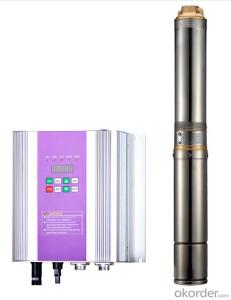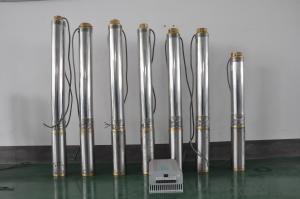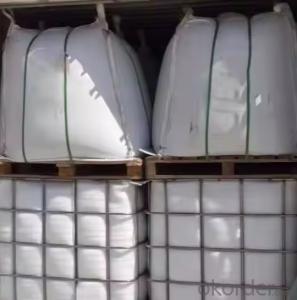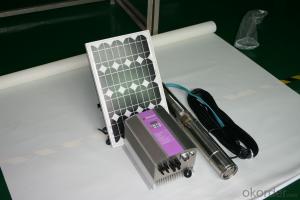SOLAR WATER PUMP DC & AC Water Pump System
- Loading Port:
- China main port
- Payment Terms:
- TT or LC
- Min Order Qty:
- 3 set
- Supply Capability:
- 10000000 set/month
OKorder Service Pledge
OKorder Financial Service
You Might Also Like
CNBM Group is short for China National Building Materials Group Corporation, which is established in 1984 with approval from the State Council
CNBM Group is the largest comprehensive building materials industry group in China
The Group has a total asset of over RMB 360 billion, more than 180,000 employees and 17 subsidiaries, and Solar is part of our business .
Solar water pump contains solar panels +inverter +pump . We have both DC and AC water pump system ,below is part of our products .
For other water head or daily flow ,we can discuss case by case .
Type one:SPA4370010
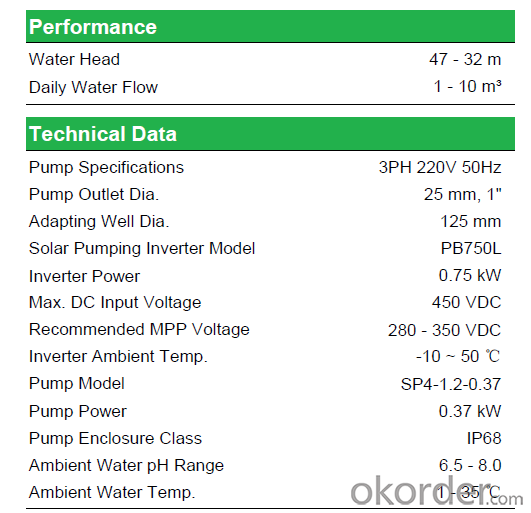
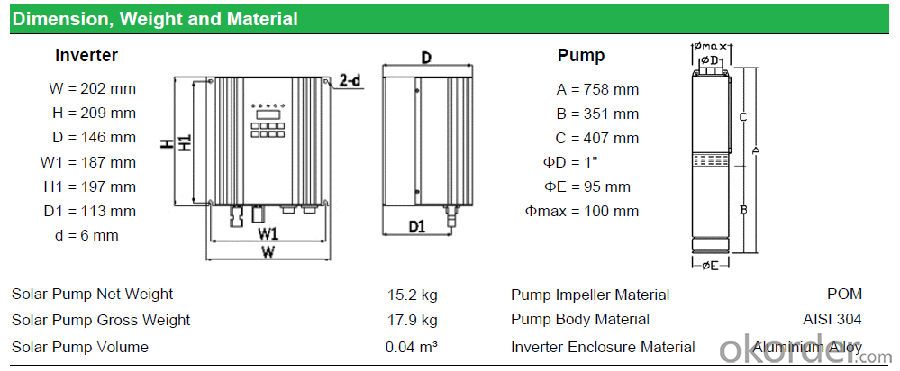
Type two:SPB626K180
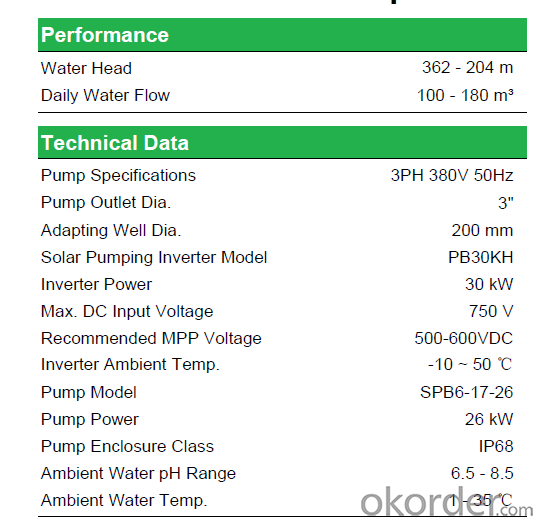
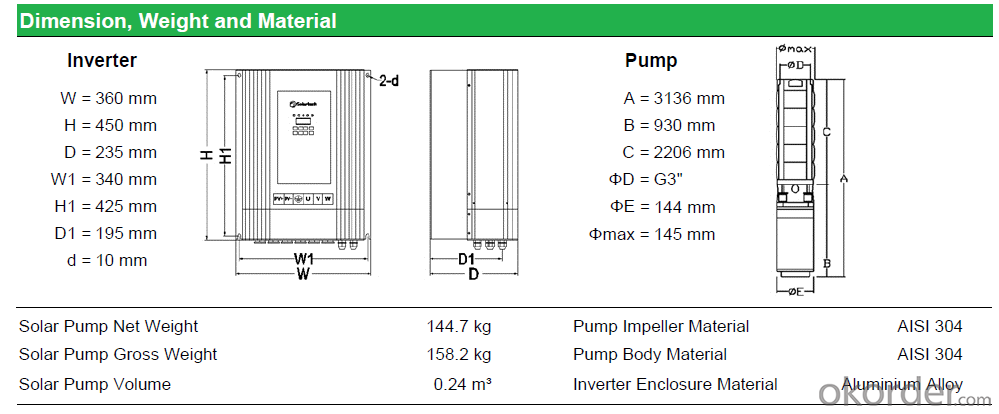
- Q:Can a solar pump be used for irrigation in sandy soils?
- Yes, a solar pump can be used for irrigation in sandy soils. Sandy soils have good drainage properties, which can be beneficial for irrigation as excess water can quickly drain away, preventing waterlogging. Solar pumps can efficiently draw water from a source such as a well or a water body, and their use in sandy soils can help provide a controlled and adequate water supply for irrigation purposes.
- Q:Can solar pumps be used in areas with limited sunlight or shaded locations?
- Solar pumps are most effective in areas with ample sunlight, as they rely on solar energy to power their operation. However, there are models available that can still function in areas with limited sunlight or shaded locations, although their performance may be reduced. It's crucial to assess the specific solar pump's capabilities and consult with experts to determine its suitability for such conditions.
- Q:How does the cost of a solar pump compare to a diesel or electric pump?
- The cost of a solar pump is generally higher upfront compared to a diesel or electric pump. However, in the long run, solar pumps are more cost-effective due to their lower operational and maintenance expenses. They rely on free and renewable solar energy, eliminating fuel costs and reducing the need for regular maintenance. Additionally, solar pumps are more environmentally friendly, resulting in savings on emissions and potential government incentives.
- Q:How does the cost of a solar pump compare to a traditional pump?
- The cost of a solar pump typically varies depending on the size and capacity of the system, as well as the specific brand and model. However, in general, the upfront cost of a solar pump is higher than that of a traditional pump. Traditional pumps are typically powered by electricity or diesel, which are relatively inexpensive energy sources. On the other hand, solar pumps utilize solar panels to convert sunlight into energy, which can be costly to install and maintain. Although the initial investment in a solar pump may be higher, it is important to consider the long-term financial benefits. Solar pumps do not require any fuel or electricity to operate, making them significantly cheaper to run and maintain over time. This can result in substantial savings on energy costs, especially in areas with ample sunlight. Additionally, solar pumps have a longer lifespan compared to traditional pumps, reducing the need for frequent replacements and repairs. Furthermore, solar pumps are environmentally friendly as they produce no greenhouse gas emissions and have a minimal carbon footprint. This can be particularly advantageous for individuals or organizations looking to reduce their environmental impact and contribute to sustainable practices. In summary, while the initial cost of a solar pump may be higher compared to a traditional pump, the long-term savings on energy costs and the environmental benefits make it a worthwhile investment.
- Q:Can solar pumps be used for water supply in educational institutions or universities?
- Yes, solar pumps can be used for water supply in educational institutions or universities. Solar pumps are a sustainable and environmentally friendly solution that can effectively pump water from wells, rivers, or other sources to meet the water supply needs of these institutions. They can provide a reliable and continuous water supply, especially in regions with abundant sunlight. Additionally, using solar pumps can reduce dependence on traditional electricity sources and help educational institutions contribute to a greener and more sustainable future.
- Q:Can solar pumps be used in areas with high temperatures?
- Yes, solar pumps can be used in areas with high temperatures. In fact, solar pumps are often more efficient in hotter climates as the high temperatures can enhance the performance of solar panels, leading to increased water pumping capabilities. Additionally, solar pumps do not rely on fuel or electricity, making them a reliable and cost-effective solution for areas with high temperatures where traditional power sources may be limited.
- Q:Are there different types of solar pumps available?
- Yes, there are various types of solar pumps available, including submersible solar pumps, surface solar pumps, and solar-powered irrigation systems. Each type is designed for specific applications and offers different features and benefits.
- Q:How does a solar pump help in reducing the risk of crop failure?
- A solar pump helps in reducing the risk of crop failure by providing a reliable and sustainable source of water for irrigation. It allows farmers to efficiently water their crops, even in remote areas with limited access to electricity or unreliable power supply. By harnessing solar energy to power the pump, it eliminates the dependence on expensive and polluting fossil fuels. This not only reduces operational costs for farmers but also minimizes the environmental impact. With consistent access to water, crops can be adequately nourished, leading to improved yields, increased food security, and reduced vulnerability to droughts or water scarcity, ultimately lowering the risk of crop failure.
- Q:What is the expected lifespan of the motor in a solar pump?
- The expected lifespan of a motor in a solar pump can vary depending on factors such as the quality of the motor, usage patterns, and maintenance practices. However, on average, a well-maintained and high-quality motor in a solar pump can be expected to last for around 10 to 15 years.
- Q:Are there any special requirements for installing a solar pump on a rooftop?
- Yes, there are some special requirements for installing a solar pump on a rooftop. Firstly, the rooftop should have a suitable area that receives ample sunlight throughout the day. This is crucial as the solar panels need sufficient exposure to sunlight to generate the necessary power to run the pump. Additionally, the rooftop should be structurally strong enough to bear the weight of the solar panels and the pump system. It is recommended to consult a structural engineer to ensure the rooftop can withstand the load. Furthermore, the rooftop should be free from any shading obstructions such as tall buildings, trees, or other structures that may cast shadows on the solar panels. Shading can significantly reduce the efficiency of the solar panels and may result in insufficient power generation. In terms of electrical requirements, the rooftop should have a suitable electrical connection to connect the solar panels to the pump system. An electrician may be required to install the necessary wiring and ensure proper grounding to ensure the system's safety. Lastly, it is important to comply with local regulations and obtain any necessary permits or approvals before installing a solar pump on a rooftop. This may vary depending on the location and jurisdiction, so it is important to check with the relevant authorities or consult a professional solar installer to ensure compliance with all requirements. Overall, installing a solar pump on a rooftop requires careful consideration of the rooftop's suitability, structural strength, shading obstructions, electrical connections, and compliance with local regulations. Consulting with professionals and experts in the field will help ensure a successful and efficient installation.
1. Manufacturer Overview |
|
|---|---|
| Location | |
| Year Established | |
| Annual Output Value | |
| Main Markets | |
| Company Certifications | |
2. Manufacturer Certificates |
|
|---|---|
| a) Certification Name | |
| Range | |
| Reference | |
| Validity Period | |
3. Manufacturer Capability |
|
|---|---|
| a)Trade Capacity | |
| Nearest Port | |
| Export Percentage | |
| No.of Employees in Trade Department | |
| Language Spoken: | |
| b)Factory Information | |
| Factory Size: | |
| No. of Production Lines | |
| Contract Manufacturing | |
| Product Price Range | |
Send your message to us
SOLAR WATER PUMP DC & AC Water Pump System
- Loading Port:
- China main port
- Payment Terms:
- TT or LC
- Min Order Qty:
- 3 set
- Supply Capability:
- 10000000 set/month
OKorder Service Pledge
OKorder Financial Service
Similar products
New products
Hot products
Hot Searches
Related keywords
